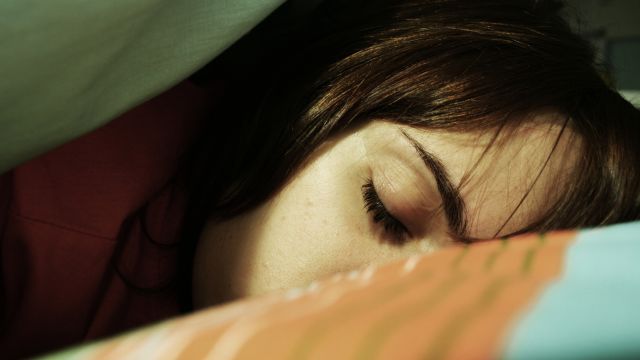Photo Credit: Ana C, via Flickr Creative Commons
My Irish Dad seemed to have a pithy saying for any occasion. When we protested as kids that we couldn’t possibly go to sleep due to excitement or sadness or worry, he would dismiss our resistance by passing on to us what his Mom had said to him when he was a child. “Go to sleep now,” he would say, “A good laugh and a long sleep are the two best cures for anything. We’ll have a laugh together in the morning.” His familiar instruction brought gentle direction, comfort and closure to the day.
As an adult, I have found my Dad’s wisdom to contain powerful medicine. At any and every age, we need our sleep. It seems to be the golden chord of sustenance that soothes and repairs body, mind and spirit as it weaves together our health and well being. The Centers for Disease Control and Prevention (CDC) reports that more than 25 percent of the U.S. population does not get enough sleep, while nearly 10 percent experience chronic insomnia. According to the CDC, “insufficient sleep is associated with a number of chronic diseases such as diabetes, cardiovascular disease, obesity and depression.”
Dangers of Sleep Apnea
A study by researchers at the Department of Internal Medicine of Quillen College at Tennessee State University cite a common medical condition known as obstructive sleep apnea (OSA). They found that OSA is associated with coronary heart disease, heart failure and cardiac arrhythmias. It also is associated with an increase in hypertension and C-reactive protein. Sleep disturbance can also be a symptom of depression. Because of the interrelatedness of sleep and depression, it is vital that anyone struggling with sleep problems discuss this with their healthcare provider.
The promotion of regulated sleep that supplies both quantity and quality rest is known as sleep hygiene. Tips for fostering optimal sleep hygiene must take into consideration psychological factors, physical comfort and establishing an environment that is disruption-free.
Three Tips If You Just Can’t Sleep
1. Calm Your Mind
Often when we get into bed, we drag with us all of the cares and worries of the day. Instead of continuing to mentally rehash a laundry list of unfinished obligations and concerns, place your focus on slow, deep, rhythmic breathing. The breath can be the bridge that eases you from the busyness of the day to the stillness of calm needed to relax.
Visualization is another effective tool that engages and harmonizes both mind and body. As you lie in bed with eyes closed, imagine a relaxing scene. This could be a favorite park, a warm beach, a beautiful sunset or any other scene that feels welcoming, safe and enjoyable. Allow your senses to absorb the delightful nuances of your chosen image as you give yourself permission to unwind and enjoy every detail.
If, overtime, you find yourself unable to manage cumulative stress and worry, instead of reaching for a pill, cognitive behavior therapy (CBT) has been shown to be an effective treatment for chronic sleep problems, even benefiting older adults who have been taking sleep medications for years.
2. Burn Energy Through the Day
To sleep better at night, be active during the day. A study in the Journal of Clinical Sleep Medicine found that 30 minutes of moderate exercise daily helped postmenopausal women sleep an extra 45 minutes per night. Sixty to ninety minutes before bedtime, wash away stress by taking a hot bath for 20 to 30 minutes.
A study conducted by New York Hospital-Cornell Medical Center found that body temperature naturally dips at night, starting two hours before sleep. Raising body temperature a degree or two with a hot bath will precipitate a subsequent steep drop in temperature, paving the way for deep sleep. A hot shower doesn’t work as well as a hot bath, but has been shown to have some effectiveness.
3. Set the Stage for Sleep
Establishing a regular nightly routine before going to bed helps to shift the brain into sleep mode. Consistent winding-down habits of laying clothes out for the morning or brushing your teeth can be very sleep-conducive. In order to create a disruption-free environment, tend to the amount of light, noise and temperature in your bedroom. The darker your room is the better for sleep. Minimize all light whether from a window or from electronics. If you get up to go to the bathroom during the night, install a dim red bulb in your bathroom. Research has found that it is less stimulating than a bright white light, so it will be easier for you to fall back to sleep.
Wearing soft earplugs or using an ambient sound device can help to buffer any extraneous noise. The optimal room temperature for maintaining a restful sleep is between 60 and 70 degrees. If you enjoy aromatherapy, choose a calming scent like lavender and spritz your bedroom lightly before retiring.
Maintaining a healthy lifestyle requires energy, diligence and consistency. We work hard by day and we deserve to sleep well each evening. Little children are not the only ones who need the security and sweetness of being tucked in each night. Healing words at the close of a long day can provide a cocoon of comfort.
Although my Irish Dad has not been with us for many years, his soothing blessing at bedtime still echoes in my mind and heart. After kissing us good night, he’d say, “I love you. Until I see you in the morning, may God hold you in the palm of His hand.”
Discover more ways to live your healthiest life with tips from Dean Ornish.
This content was originally published on Ornish Living.






